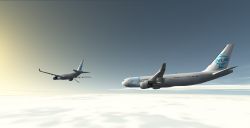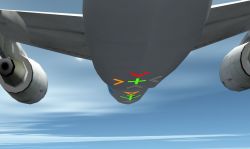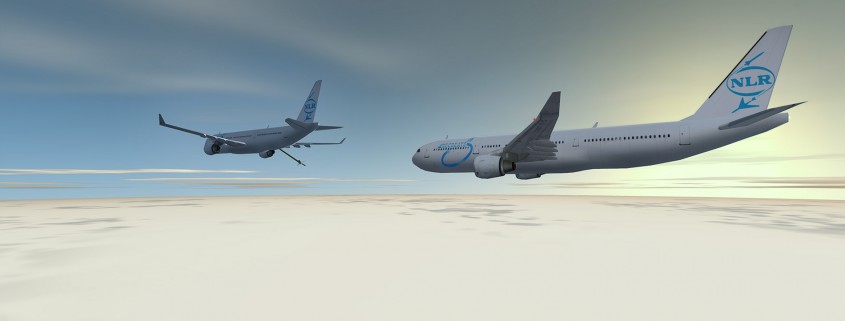
RECREATE – Formation Flight
International simulation experiments conducted at NLR
Passenger aircraft can safely be refueled while airborne, even during moderate turbulence. These were the findings of flight simulation experiments recently conducted at the NLR and DLR (the German partner organization of the NLR).
During eight experiments, the research flight simulators GRACE (NLR – Amsterdam) and GECO (DLR – Braunschweig) were connected via the internet. GRACE served as the passenger aircraft or ‘cruiser’, while GECO served as the tanker aircraft or ‘feeder’. During these experiments, 28 professional airline pilots flew various scenarios in which they “in addition to the standard refueling operations“ also discovered how they could ensure that no dangerous situations transpired. Examples include the encounter of different levels of turbulence, engine failure during the refueling process, or visibility suddenly turning poor. The pilots could discontinue the operation at any time by commanding the automatic pilot to execute an abort maneuver, which returned both aircraft to a safe distance from each other.

RECREATE – Relative Position Indicator
RECREATE
These experiments were conducted in the framework of the European project RECREATE (REsearch on a CRuiser Enabled Air Transport Environment). In 2013, similar experiments were conducted, in which it was determined that the cockpit instruments needed to be improved in order to present the required information to the pilots in a way that reduces the workload. Based on the pilots’ recommendations, the cockpit instruments were improved for the second stage of the experiments.
Workload
The ‘cruiser-feeder’-concept involves a fully automated procedure which is continuously monitored by the pilots and which they can abort at any time, if necessary. All of the participating pilots were of the opinion that safety was guaranteed because they could intervene if necessary, and this without significantly increasing their existing workload. Under normal conditions, the automatic pilot ensures that the operation is completely safe.
Fuel-savings
This research has confirmed that air-to-air refueling during long-distance routes can provide substantial savings in terms of fuel consumption and CO2 emissions. NLR has applied its advanced knowledge and facilities to successfully conduct this project. Moreover, NLR is responsible for the coordination of the RECREATE project, which is being subsidized by the European Commission. The RECREATE project will end in January 2015.
More information:
http://www.youtube.com/watch?v=cLzfIncPNxs&list=UU_dR_Pg0IUkTek7G5M2mDfA
http://www.cruiser-feeder.eu



